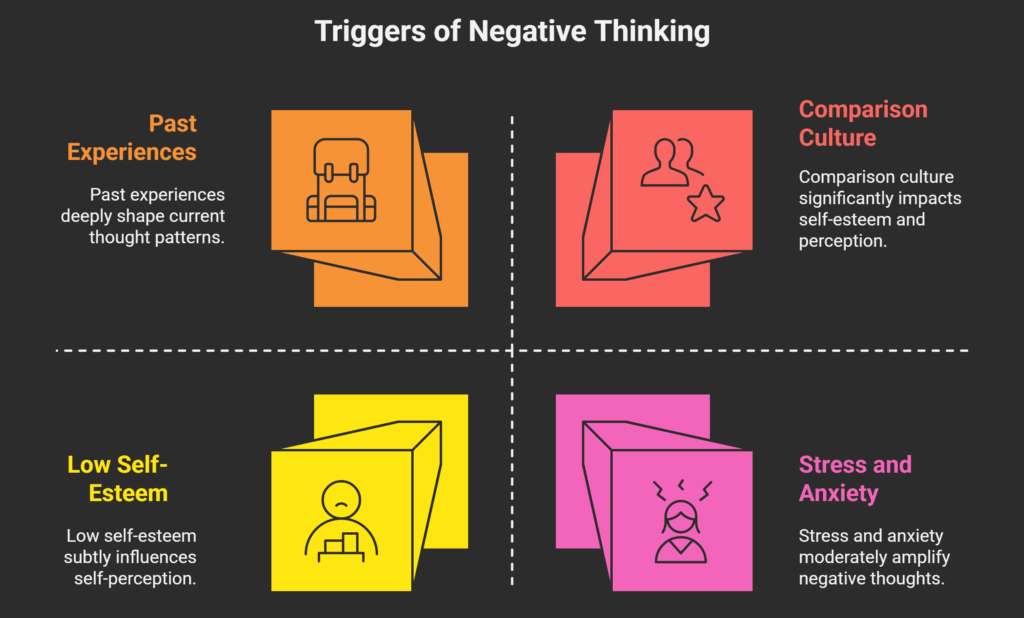
Imagine this: You’re walking through a beautiful park, but instead of noticing the blooming flowers and the warmth of the sun, you focus on the one wilted leaf on the path. That’s what negative thinking does. Learning how to stop negative thinking can help you shift your attention, brighten your mindset, and break the cycle of “what ifs” and “I’m not enough.”
But here’s the thing: negative thinking is not who you are. It’s just a habit, a pattern of thoughts that can be unlearned. Like clouds passing through the sky, these thoughts don’t have to define you. You can choose to let them go, replacing them with clarity, confidence, and joy. Connect with us for Malayalam online therapy.
What Causes Negative Thinking?

Negative thinking often feels like a weight on our shoulders, dragging us down without warning. But where does it come from? Let’s break it down and uncover the hidden triggers that fuel this relentless cycle.
Past Experiences :
Imagine carrying a backpack filled with unresolved pain, mistakes, or trauma. Every time something reminds you of the past, the weight gets heavier. These past experiences shape how we view the present, often distorting reality through the lens of hurt. But here’s the catch: the past doesn’t have to dictate your future.
Stress and Anxiety :
Ever had a moment where one small stressor spirals into a whirlwind of catastrophic thoughts? It’s like being stuck in a loop where your mind races with worst-case scenarios. The mind is quick to overthink, especially in high-pressure situations, amplifying fear and negativity. But the key is slowing down and grounding yourself.
Low Self-Esteem :
When you doubt your worth, the world around you can feel like a reflection of that doubt. Low self-esteem convinces us that we’re not good enough or that we’ll never succeed. It turns the smallest critique into a confirmation of our fears. But remember: your worth isn’t defined by external circumstances. It starts from within.
Comparison Culture :
With the rise of social media, it’s easier than ever to compare our behind-the-scenes to others’ highlight reels. We often feel like we’re falling short when we measure our lives against the curated success of others. But here’s a reminder: social media is just a snapshot, not the full story. Your journey is unique, and you don’t need to measure it by someone else’s standards.
Biological Factors :
Sometimes, it’s not just the thoughts themselves, it’s the brain’s chemistry at play. Hormonal imbalances or mental health conditions can make it more difficult to break free from negative thinking. But acknowledging this is the first step.

The Side Effects of Negative Thinking
Negative thinking isn’t just an annoying mental habit; it’s a silent saboteur that can impact every corner of your life. Here’s how:
1. Mental Health Decline :
Negative thinking can trap you in a cycle of anxiety, depression, and burnout. It’s like an emotional fog that clouds your clarity and makes the world seem like a much darker place. The longer you dwell in these thoughts, the harder it becomes to escape.
2. Physical Health Impact :
The effects of negativity aren’t confined to your mind. Stress induced by constant worry or negative thought patterns can show up in the form of chronic headaches, fatigue, and even a weakened immune system. Your body feels the toll, reminding you that mental health is deeply connected to physical health.
3. Strained Relationships :
Constant negativity can push others away, like a magnet repelling its opposite. People might start to avoid you, leaving you feeling isolated and disconnected. Those closest to you, friends, family, partners, might feel emotionally drained by your pessimism, ultimately straining your relationships and creating a wall between you and the support you need.
4. Lost Opportunities :
Fear of failure, rejection, and self-doubt become your greatest barriers. Negative thinking paralyzes you from taking risks, trying new things, or reaching for new opportunities. You remain stuck in a comfort zone that stifles growth and prevents you from experiencing life to its fullest potential.
How to Stop Negative Thinking: Proven Strategies
Stopping negative thinking involves a combination of mindfulness, cognitive reframing, and daily habits. Here are some effective methods:
1. Identify the Triggers:
- Awareness: Keep a journal to note when and why negative thoughts come up.
- Patterns: Recognize the situations or feelings that often lead to negativity.
2. Challenge Your Thoughts:
- Question the Thought: Is it based on facts, or is it just an assumption?
- Reframe the Perspective: Instead of saying “I’m not good at this,” try thinking “I’m learning and getting better.
3. Practice Gratitude:
- Daily Gratitude List: Write down three things you’re thankful for each day.
- Shift Focus: Practicing gratitude helps counteract negativity by highlighting the positive aspects of life.
4. Use Mindfulness Techniques:
- Meditation: Concentrate on your breath to stay grounded in the present moment.
- Mindful Observation: Acknowledge the thought, recognize it, and let it go without judgment.
5. Surround Yourself with Positivity:
- Positive People: Spend time with uplifting friends and mentors.
- Inspirational Content: Read books or watch videos that promote optimism.
6. Set Realistic Goals:
- Break It Down: Split larger tasks into smaller, manageable steps.
- Celebrate Progress: Acknowledge even small achievements to enhance your confidence.
7. Limit Exposure to Negativity:
- Social Media Detox: Take breaks from platforms that trigger feelings of comparison.
- Filter Content: Choose news and entertainment that inspire you rather than bring you down.
8. Seek Professional Help:
If negative thinking becomes overwhelming, therapy can offer valuable tools and support. A trained psychologist can help you navigate cognitive-behavioural techniques to reshape your thought patterns.
The Power of Positive Affirmations
One of the most effective tools in combating negative thinking is the practice of positive affirmations. These are short, empowering statements that challenge the negative thought patterns we often have about ourselves. Instead of letting your mind spiral with doubt or fear, you replace those thoughts with positive beliefs that promote self-worth and hope.
For example, if you frequently think, “I can’t do this,” replace it with, “I am capable of overcoming challenges.” Over time, positive affirmations can rewire your brain, boosting your self-esteem and fostering a mindset of growth and possibility. This practice works because the more you repeat these affirmations, the more your subconscious mind begins to accept them as truth.
The Role of Physical Exercise in Reducing Negative Thoughts
Exercise serves as a powerful mood enhancer, and its effects on mental well-being are significant. Engaging in physical activity triggers the release of endorphins, the body’s natural “feel-good” hormones, which can quickly elevate your mood and alleviate feelings of anxiety and stress.
Whether you prefer a brisk walk, yoga, or a high-intensity workout, exercise helps redirect your attention from negative thoughts and fosters a sense of control. Additionally, the feeling of achievement that comes from finishing a workout can enhance your self-esteem and diminish negative self-talk.
Breaking Free from the Comparison Trap
In today’s world, social media plays a significant role in fueling negative thinking through constant comparisons. We often compare our lives to others, thinking we aren’t good enough or successful enough. However, comparison only breeds negativity.
To combat this, practice self-acceptance. Recognize that everyone’s journey is unique, and success doesn’t look the same for everyone. Limit your social media usage and focus on your own growth rather than what others are doing. Embrace the idea that your value isn’t defined by comparison.

Reframing Your Inner Narrative
We all have an inner dialogue, but for some, it can be overwhelmingly negative. Reframing that narrative is one of the most effective ways to break the cycle of negativity. Instead of thinking, “I will fail,” try shifting your inner voice to, “I can learn from my mistakes and improve.”
By consciously changing the way we speak to ourselves, we create a more empowering narrative. This shift from self-criticism to self-compassion is essential for overcoming negative thinking and building a healthier mindset.
Embrace Positivity and Break Free from Negative Thinking
Negative thinking can feel like an insurmountable obstacle, but as we’ve explored in this guide, it’s entirely possible to break free from its grasp. By understanding the root causes of negative thoughts, recognizing their harmful side effects, and implementing strategies like positive affirmations, mindfulness, physical exercise, and therapy. For online therapy services, connect with us; you can create lasting change in your mindset.
Remember, it’s not about completely eliminating negative thoughts but about learning how to manage them effectively. With time, patience, and consistent effort, you can rewire your brain to focus on the positive aspects of life, leading to improved mental well-being and a more joyful, fulfilled existence.




